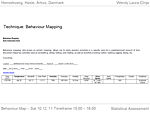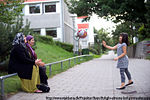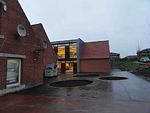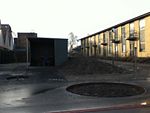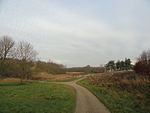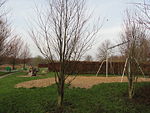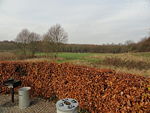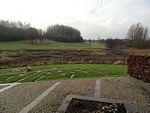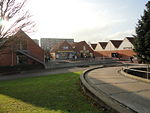The square around Herredsvang Kulturhus: Difference between revisions
| Line 250: | Line 250: | ||
- age: children, teenagers, young people, middle age people, elderly people | - age: children, teenagers, young people, middle age people, elderly people | ||
- civil status: teenager / youth groups, couples, families, single persons | - civil status: teenager / youth groups, couples, families, single persons | ||
- economical status: employed, unemployed / disadvantaged, local / foreign students | - economical status: employed, unemployed / disadvantaged, local / foreign students | ||
- background: danish / foreign (local vs. immigrants : 50% - 50%) | - background: danish / foreign (local vs. immigrants : 50% - 50%) | ||
- belief: free thinkers, religious Christians / Muslims | - belief: free thinkers, religious Christians / Muslims | ||
- interest towards outdoors: active groups (joggers / bikers / skaters / basket-/football players), semi-active (dog walkers / wanderers / golf club members), passive (sitting, talking, watching / surveilling the children) | - interest towards outdoors: active groups (joggers / bikers / skaters / basket-/football players), semi-active (dog walkers / wanderers / golf club members), passive (sitting, talking, watching / surveilling the children) | ||
A campaign conducted in collaboration between Realdania, Education and Housing Companies' Association will help to enhance the living in public housing for the benefit of residents. Housing Organizations and communities are invited. The idea is that these projects are sought by individual housing associations and housing departments in cooperation with municipalities. Conditions for the grant will be inter alia the provision of funding from other sources for the realization of at least 50 percent of the total cost. | A campaign conducted in collaboration between Realdania, Education and Housing Companies' Association will help to enhance the living in public housing for the benefit of residents. Housing Organizations and communities are invited. The idea is that these projects are sought by individual housing associations and housing departments in cooperation with municipalities. Conditions for the grant will be inter alia the provision of funding from other sources for the realization of at least 50 percent of the total cost. | ||
Revision as of 18:11, 24 January 2012
---> back to overview of Case Study List
Landscape in the City Quarters - Everyday Movement: The square around Herredsvang Kulturhus, Århus, Danmark
Short Introduction to the Area of Study
please give a short summary why you have chosen this area, its main features and context (circa 150 words)
The area chosen as a study site consists of an everyday landscape in the city quarters which bursts of the hustle and bustle of everyday movement. It is at the same time a social interaction zone highly filled with the human component of landscape and also present with the green side of urban development. The main reason which called my attention, besides the small district community layout within the urban fringe of Brendstrup Skov's outskirts, was the new redesign of the square and surroundings, occurred in the past few weeks (and still ongoing - 15th of Nov. 2011).
Hasle Library and Civic Centre in Herredsvang
The main part of Herredsvang Kulturhus is dedicated to Hasle Bibliotek, which hosts a lot of uses for interested members or guests (lecture room, chess tables, playground for small children). Other features at the Culture House are: Café, Shop, [Textile and other types of] Workshop[s] and Computer Services. There have been various efforts: cultural events, projects, associative and courses and counseling. Classes of Zumba! or Aerobics for children were hosted free of charge from time to time.
Main activities
• activities and initiatives within the knowledge & learning for children and adults
• democratic citizenship and civic involvement
Greatest successes
• activities with children and adolescents: Skoleskak Tournament theater with Opgang2, "Pimp your hood"
• courses for adults: image carpet manufacturing, glass and drawing courses, IT training
Biggest Challenges
• structure of working in a very organic organization
• learn more (adult) users of the house
• increased visibility and knowledge about how to use and what happens in Kulturhus
Helligåndskirken (The Church of the Holy Spirit)
Helligåndskirken in the suburb Herredsvang, was built in 1984 and is one of the more recent churches in the area. The architect is the Aarhus company "Sahl & Thomsen, Hans Knudsen". The parish of Helligåndskirken was divided from "Christians Sogn (parish)" in 1975. The first Helligåndskirke was a road church rented by "Kirkefondet". This little church on Snogebæksvej, was the setting of the parish service from 1973 until the new church was consecrated on Palm Sunday 1984. The church bell of the tower however was built in 1997.
Helligåndskirken is the setting of many activities during the week and is a central meeting place of an area mainly populated by refugees and immigrants + single family houses. The parish has app. 8400 inhabitans.
About the Quarters: Hasle / Herredsvang in Århus N / Århus V
Hasle is a suburb of Århus in Denmark. It has a population of around 22,000 (as of 2007). (http://en.wikipedia.org/wiki/Hasle,_Aarhus)
A smaller part of it - or next to it referring on other sources - consists of Herredsvang district, upper North in Århus, yet on most of maps belonging to Århus West (although it's the further Eastern part of it).
There are around 5000 inhabitants in Herredsvang where 50% are from another country than Denmark. The area is consisting of mainly apartments, but also houses.(http://en.wikipedia.org/wiki/Aarhus_V)
Either if immigrants or simply born by immigrant parents, this mixed social component lives in Herredsvang landscape in rented concrete public housing appartments, built by different Housing Associations, such as Statsbo, which, for example, comprises 257 homes in 6 blocks of 4 and 5 storeys, built in 1980-81 and youth residences built in 06/2007. The facades were renovated in 06/2007. All apartments have balconies, most west-facing and the other facing south. The blocks form courtyards, which are green areas with playgrounds. The department found a nursery and kindergarten. The location is near Herredsvej and Hasle Ringvej in Århus V. (http://www.statsbo.dk/index.php?id=afdeling9)
Living Conditions:
Laundry: Yes
Refrigerator: Yes (not young)
Common Premises: Yes
Cable TV: Stofa
Transportation: Bus
School / nursery: 100 m
Husbandry: indoor cat
Elderly friendly: No
Disabled access: No
Shopping: 100 m
Even if the quarter bursts with community movement, being far from city center and quite close to nature (present in surroundings, as the open Golf field towards East - also known as Marienlyst Park - and the Brendstrup Forest next to it) reinsures itself with peace and tranquility, seeming very still at times (at least for me as an outsider), although it might cross vicinity with acknowledged ghetto areas in Århus, where the crime and unemployment rate are presented high compared to the other parts.
Additional notes:
Kulturhus Herredsvang stands for Herredsvang Culture House.
Helligåndskirken stands for The Church of the Holy Spirit.
Brendstrup Skov stands for Brendstrup Forest.
Kornmodsbakken means Hill with Grains which lies in between Marienlyst Park and Brendstrup Skov. [ see http://www.marienlyst-golfklub.dk/ for more information about the green area >> Marienlyst Golf Course ]
Exercise 1: Sketching the Landscape
Time frame: October 25 - November 15, 2011
Student activities:
- Creation of analytical drawings and sketches
- Presentation of results
Please upload a selection of your drawings/sketches/mental maps and add them to the image gallery
Sketches and Drawings
Exercise 2: Landscape Layers
Time frame: November 15 - 29, 2011
- time based changes and 'landscape biography', and/or:
- topography, open spaces, built, green, traffic and water structures on different layers. *Definition of zones with coherent character
- Description of this character.
Please publish your findings here
Exercise 3: Behaviour Patterns
Time frame: December 6 - 20, 2011
- How do people behave in this area? How do they use the space? What is important for them?
- Observation of study area, interviews with local people and mapping of use patterns.
- Preparation of short presentation
Please publish your findings here
Method: simple observation of the people around the area, taking notes and recording short movies on camera; not interviewing people, due to severe cold outside (and illness reason for now)
Herredsvang Behaviour 1 - http://www.youtube.com/watch?v=FsAb5U3sQbA&feature=related
Herredsvang Behaviour 2 - http://www.youtube.com/watch?v=F6P9mN3itEI&feature=related
Herredsvang Behaviour 3 - http://www.youtube.com/watch?v=TIdM-LdVkkQ&feature=related
Herredsvang Behaviour 4 - http://www.youtube.com/watch?v=bXF2x_6Uons&feature=related
Herredsvang Behaviour 5 - http://www.youtube.com/watch?v=mydYw59iO7Q&feature=related
Herredsvang Behaviour 6 - http://www.youtube.com/watch?v=hgr4YF7VzTs&feature=related
Brief Answers for the upcoming Group Discussion on 13th of December based on the Questions:
Which behaviour patterns are characteristic ?
Commercial / Shopping (as in Selling and Purchase of goods within the area) - the main function of the buildings in the square
Transiting - in and out of the Residential / Commercial / Cultural / Natural zone
Recreational - such as walking, jogging, biking within the natural outskirts of the residential zone; during the summer, also sitting on benches and grass, playing golf, football or other sports / activities outdoors / sunbathing also on open balconies while reading for exams :) and other such things
Do you find any surprising behaviour patterns ?
actually, not.
Do space and behaviour correspond ?
they do, quite.
How does people's behaviour change the place ?
hard to read this part.
Exercise 4: Communication Concepts
Time frame: December 19, 2011 - January 17, 2012
- Based on the different landscape assessment approaches students will develop a communication concept for their area of study
- Which measures would be necessary for enhancing the awareness for the area?
- Students are free to choose their method.
An upgrade of outdoor areas and improved community facilities will help to enhance life in the public housing neighbourhoods. http://www.realdania.dk/Projekter/Byen/Boligliv-almene-boligomraader.aspx
Audience
Seen from different points of view, there are more user groups according to:
- age: children, teenagers, young people, middle age people, elderly people
- civil status: teenager / youth groups, couples, families, single persons
- economical status: employed, unemployed / disadvantaged, local / foreign students
- background: danish / foreign (local vs. immigrants : 50% - 50%)
- belief: free thinkers, religious Christians / Muslims
- interest towards outdoors: active groups (joggers / bikers / skaters / basket-/football players), semi-active (dog walkers / wanderers / golf club members), passive (sitting, talking, watching / surveilling the children)
A campaign conducted in collaboration between Realdania, Education and Housing Companies' Association will help to enhance the living in public housing for the benefit of residents. Housing Organizations and communities are invited. The idea is that these projects are sought by individual housing associations and housing departments in cooperation with municipalities. Conditions for the grant will be inter alia the provision of funding from other sources for the realization of at least 50 percent of the total cost.
PROJECT INFORMATION
Location: Nationwide Amount: about. 100 million. £ Started: 2011 Completed / expected completion: 2016 Partners: Education and Housing Associations National Association
The housing associations were 30 - 40 years since absolute leader in terms of developing social housing initiatives. Common facilities and open spaces reflect, however, often the time when the buildings were listed and over the years in many places have become pretty worn and outdated. The smaller shopping centers, typically located on the outskirts of the settlements, have lost their original function and no longer function as gathering places for residents. The buildings are as autonomous enclaves and could usefully be linked better with the surrounding areas.
"We hope this campaign could help to create a new development of social housing initiatives in the coming years. And there's plenty to be done. Time is in many places throughout the accommodation facilities, lawns are deserted, and there is no relation to life in the surrounding areas," says CEO Hans Peter Svendler, Realdania, and continues: "Our ambition is to strengthen both the residents and organizations for creative involvement in initiating social drivers and demonstration projects which envisage the new, by providing new dynamics, and means of how social cohesion strengthens within the public housing estates. We want to help make life a little more fun in public housing for the benefit of all residents and the rest of us who come there." “We look forward to realizing examples of new physical environment and organization that corresponds to new generations" says Rolf Andersson, building director and chairman of AlmenNet.
Over the next five years, initiator Realdania will manage 2 to 3 bidding rounds where creative residents and others can offer "wild ideas", while housing departments, housing associations and municipalities can apply for grants and financing to develop ideas and realize larger demonstration projects. The first licensing round took place in autumn 2011. http://www.realdania.dk/Presse/Nyheder/2011/Realdania+s%C3%A6tter+fokus+p%C3%A5+livet+i+almene+boligomr%C3%A5der.aspx
Final Presentation - Communication Concept for Raising Awareness
"The philosophy is to cultivate what is unique about each individual place."
Theory & Inspiration
Examples in Practice
Please publish your findings here
Idea No. 1 – Temporary Installation to Increase Awareness of the Sitting Potential of the Place and also hinting on providing free wireless access creating thus a local Hot-Spot for Public Use Outdoors
Idea No. 2 – Guerilla Gardening / Schooling Slow Food Movement / Slow Food Gardening
What’s more important than teaching kids the importance of good, clean, and fair food ? Teaching kids how to plant, grow, and harvest it ! http://www.slowfoodusa.org/index.php/slow_food/blog_post/44_gardens_in_44_days/
Slow Food Movement Miami - courtesy of http://www.slowfoodusa.org/index.php/slow_food/blog_post/44_gardens_in_44_days/
Idea No. 3 – Occasional Installation for Community Happenings such as The Cooking Monument http://www.raumlabor.net/?p=88
The Cooking Monument - courtesy of http://www.raumlabor.net/?p=88
Idea No. 4 – Opening up the Kulturhus also on the other side (towards the Residential Area) by hosting the Workshops also Outside at least as a Seasonal Approach (during the warmer months of the year) for an increasing share of Outdoor Facilities
Idea No. 5 – Transform the Informal Biergarten into a Mixture of Formal and Informal Green Structure Café for the Entire Neighbourhood http://www.detgodeboligliv.dk/
Concept Sketch - courtesy of http://www.detgodeboligliv.dk/
Idea No. 6 – Inserting Public Fitness Facilities to increase use of the Outdoors by all segments of the Society
Image Gallery
References
* Please make sure that you give proper references of all external resources used.
* Do not use images of which you do not hold the copyright.
* Please add internet links to other resources if necessary.
http://en.wikipedia.org/wiki/Hasle,_Aarhus
http://en.wikipedia.org/wiki/Aarhus_V
http://www.statsbo.dk/index.php?id=afdeling9
http://www.marienlyst-golfklub.dk/
http://www.slowfoodusa.org/index.php/slow_food/blog_post/44_gardens_in_44_days/
http://www.raumlabor.net/?p=88
About categories: You can add more categories with this tag: "", add your categories






















